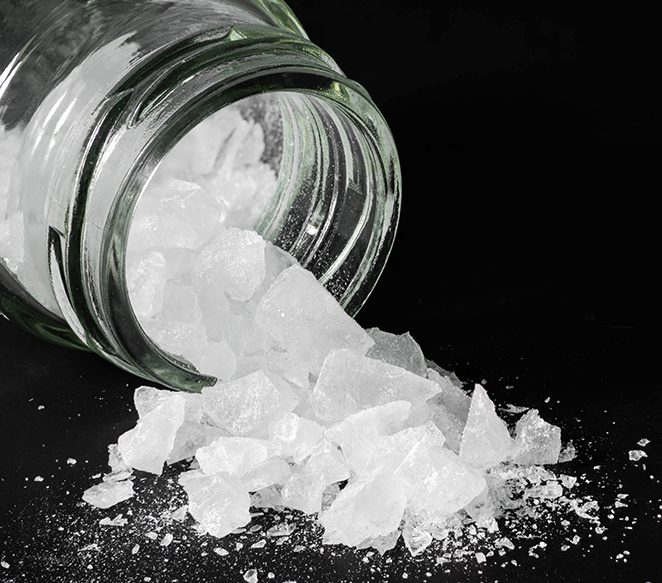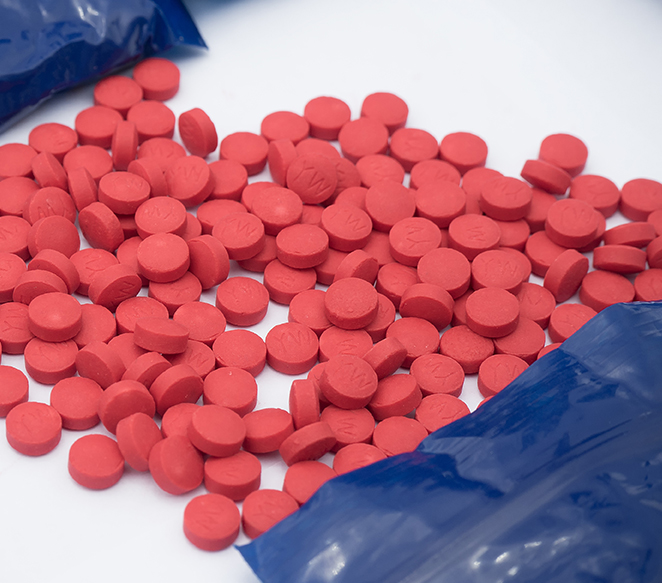
WHAT IS AMPHETAMINE?
Amphetamine is a highly addictive central nervous system stimulant. They are prescribed to treat narcolepsy, attention deficit hyperactivity disorder (ADHD), and it can suppress appetites. Even though with a prescription, you can become dependent and addicted to amphetamines. Prescriptions include generic ADHD medication, Adderall, Vyvanse, Ritalin, Concerta, Methylin, Focalin, Metadate and Dexedrine. Two active components of amphetamine are methamphetamine and dextroamphetamine, which are commonly sold illegally.
Amphetamine increases rewarding behaviors in the brain, which can affect a user’s feeling of euphoria, confidence, focus, and greater levels of energy. Students have used amphetamines to help them focus for long periods of time even when they don’t have ADHD. Studies have shown that using Adderall doesn’t help people without ADHD stay awake or focus better, but it gives a false sensation that it does.

WHAT DOES AMPHETAMINE LOOK LIKE?
Amphetamine taken orally comes in the form of white circular pills. Crystallized methamphetamine hydrochloride has an appearance of clear crystals or glass shards. The powder form before it is cooked has an off-white or slightly brown appearance.

HOW IS AMPHETAMINE TAKEN?
Amphetamine is taken orally, injected, or dissolved in water or alcohol before injection. The crystallized version of amphetamine can be smoked. When taken orally, effects occur in 15 to 20 minutes. When snorted, it takes 3 to 5 minutes to feel the effects. When injected, the effects are felt instantly. The effects can last for hours.
WHY DO PEOPLE USE AMPHETAMINE?
People use amphetamine as a prescription for sleep and attention disorders. Students use amphetamine for high energy and concentration for important tests or big projects. Others use amphetamine for a greater amount of energy and a euphoric high.
SLANG TERMS FOR AMPHETAMINE
- METH
- SPEED
- BLUE
- BLACK BEAUTIES
- ICE
- UPPERS
- BENNIES
- CRANK
HISTORY OF AMPHETAMINE
Amphetamine was first created in Germany in the late 1800s, but it wasn’t used as a stimulant until the 1930s. It was first used to treat nasal congestion and asthma. Amphetamine use drastically increased during World War II. Shortly after that, it was used to help with weight loss and hangovers. In the late 60s and 70s, amphetamines were injected by abusers because that method gave them a greater high than taking pills.
In the 1980s, the abuse of concentrated methamphetamine (known as “ice” or “crystal meth”) began increasing. In 2008, online amphetamine sales were banned without legitimate prescriptions. Today, amphetamine is used for ADHD, narcolepsy, and sometimes depression. Amphetamine in prescriptions usually doesn’t have a large enough dose to have adverse effects for patients, and the benefits for those disorders outweigh harmful side effects.
WHAT ARE THE SYMPTOMS OF AMPHETAMINE ADDICTION?
You or a loved one may be affected by amphetamine addiction. When that happens, the abuser will spend most of their time seeking out ways to obtain or use amphetamine. You may see a change in their friend group and a decline in their relationships with others. They may withdraw socially and appear to have no interest in the activities they once enjoyed. Other physical signs and symptoms are listed below.
SIGNS AND SYMPTOMS
- MOOD SWINGS
- INSOMNIA
- AGGRESSION
- INCREASED HEART RATE
- HALLUCINATIONS
- PARANOIA
- ANXIETY
- CHANGES IN RELATIONSHIPS
PARAPHERNALIA
- COOKING LAB
- GLASS PIPES WITH WAX RESIDUE
- NEEDLE AND SYRINGE
- GLASS VIALS
- LIGHT BULBS WITH BURN MARKS
- CUT STRAWS OR EMPTY INK PENS
- ALUMINUM CANS WITH PINHOLES
- TINFOIL
- GLASS VIALS
WHAT ARE THE EFFECTS OF AMPHETAMINE ADDICTION?
Someone who is addicted to amphetamine will seem hyperactive and energetic while they’re on the drug. They may stay up for days on end when they’re on a “speed run,” meaning they’ve consecutively taken meth for days. You’ll be able to tell from mood swings and aggressive behavior when they are having withdrawals. Because it can increase heart rate and blood pressure, amphetamine abuse and addiction can lead to mental and physical complications.
SHORT-TERM EFFECTS OF AMPHETAMINE ADDICTION
- LOSS OF APPETITE
- MUSCLE SPASMS OR TICS
- HIGH BLOOD PRESSURE
- INCREASED HEART RATE
- DISRUPTED SLEEP
- DEPRESSION
- FATIGUE
- INCREASED BODY TEMPERATURE
LONG TERM EFFECTS OF AMPHETAMINE ADDICTION
- ROTTING TEETH
- PSYCHOSIS
- RAPID WEIGHT LOSS
- CARDIAC ARREST
- SKIN SORES
- HEART FAILURE
- BLOOD CIRCULATION ISSUES
- INSOMNIA
AMPHETAMINE ADDICTION STATISTICS
1.5 MILLION
people aged 12 or older struggling with meth abuse in 2020.
40%
of people seeking meth abuse treatment struggle with anxiety.
2.5 MILLION
people reported using meth in 2020.
HOW IS AMPHETAMINE ADDICTION TREATED?
Barbiturate detox needs to happen under the supervision of medical professionals. Because tolerance can build up quickly from barbiturate use and abuse, detox is going to cause withdrawal symptoms. Some of the withdrawal symptoms can be deadly. Withdrawal symptoms include hallucinations, seizures, anxiety, aggression, and increased body temperature. Never try to detox from barbiturates alone if you have been taking them more often than prescribed.
At Gratitude Lodge, we can help you or your loved one with barbiturate addiction treatment. We offer detox programs, individualized counseling, supportive group therapy, a 12-step recovery program, and a pet-friendly environment. With 24/7 access to medical staff, recovering addicts will receive the best inpatient care for barbiturate addiction treatment in Orange County. We set you or your loved one up for success as they continue on their road to recovery
COMMON DRUG COMBINATIONS WITH AMPHETAMINE
Alcohol, anti anxiety medication, such as Xanax, and sedatives are commonly paired with amphetamines to take the edge off the energetic and hyperactive effects of meth. It’s commonly paired with cocaine and Ecstacy for an upper effect and paired with opioids, such as morphine or heroin. These combinations can be tough on the organs and may lead to death.
- ALCOHOL
- XANAX
- MARIJUANA
- BARBITURATES (“GOOFBALL”)
- HEROIN (“SPEEDBALL”)
- ECSTASY
- COCAINE
- OPIOIDS
TYPES OF DRUG ADDICTION WE TREAT
Click on the Addiction to learn more!
Our Partners

















